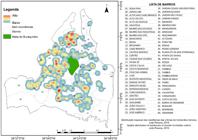Abstract
Background
The homicide, besides being a public health problem, also reveals a complex context of social inequality that prevails in capitals and larges cities of Brazil.
Objective
The objective of this study was to analyze the socio-spatial context of intentional homicide victims in a capital of Brazilian Northeast.
Method
An ecological and documentary based study with a quantitative approach was carried out in João Pessoa, state of Paraíba, Brazil, in 2015, which considered 369 victims of homicide. Data analysis was carried out in light of descriptive statistics and spatial analysis.
Results
Victims of malice murder were predominantly male, young adults, non-white, singles, and less than seven years of studies. In addition, there was overlap, to a large extent of the areas where the victims of malice murder resided, with the map of the areas with the worst socioeconomic conditions.
Conclusion
Homicide has a substantial repercussion on the epidemiological context, in addition to its lethal characteristic. The issues surrounding them, in which important complex social issues appear, are broad and difficult to change in the short term.
Keywords:
mortality; homicide; spatial analysis; social class

 Thumbnail
Thumbnail
 Thumbnail
Thumbnail

